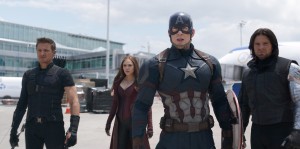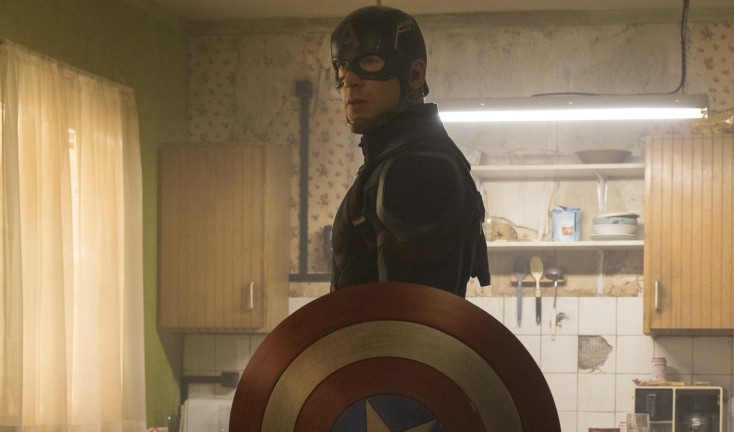
(l-r) Hawkeye/Clint Barton (Jeremy Renner), Scarlet Witch/Wanda Maximoff (Elizabeth Olsen), Captain America/Steve Rogers (Chris Evans), and Winter Soldier/Bucky Barnes (Sebastian Stan) in MARVEL’S CAPTAIN AMERICA: CIVIL WAR. ©Marvel.
By JAMES DAWSON
Front Row Features Film Critic
The differences between the irresistibly appealing “Captain America: Civil War” and the dismally dull “Batman v Superman: Dawn of Justice” offer further proof that Marvel superheroes have the kind of movie-magic mojo that consistently eludes bigscreen DC Comics characters. What has become known as the Marvel Cinematic Universe—which includes members of The Avengers, Ant-Man and welcome newcomer Spider-Man, among others who appear here—is a place that’s more interesting, more exciting and more human than DC’s drearily depressing Metropolis or Gotham City.
Marvel movies also are smart enough not to take themselves too seriously. Even though the twisty plot of this third solo Captain America outing does as much globe-hopping as a James Bond flick (and has a comparable body count), there’s always time for a little comic relief among the colorful comic-book carnage.
The conflict at the heart of “Captain America: Civil War'” involves Cap and his fellow Avengers (Robert Downey Jr.’s Iron Man, Scarlett Johansson’s Black Widow, Elizabeth Olsen’s Scarlet Witch, Paul Bettany’s Vision, Jeremy Renner’s Hawkeye, Don Cheadle’s War Machine and Anthony Mackie’s Falcon) taking sides on the issue of whether superheroes should be restricted to serving under the control of the world’s governments. Tony Stark/Iron Man is guilted into wanting to cede the group’s autonomy when confronted with information about casualties that have resulted during previous world-saving exploits. Captain America opposes the idea of heroes giving up their independence to choose where they can do good.
That philosophical split is almost the only thing the movie has in common with the 2006 Marvel Comics series that shares the “Civil War” title. Missing and very missed from the movie version are the global security agency S.H.I.E.L.D. (unfortunately eliminated at the end of Captain America’s previous on-screen outing), Thor (who appeared in the comics as a murderous cyborg-clone) and the much larger groups of us-against-them heroes in the comics. Spider-Man’s most shocking moment in the comic-book series, and his later crucial change of heart, also do not appear in the movie.
Instead, “Captain America: Civil War” inserts a decent human metaphor for the conflict, tosses in an emotional subplot involving newcomer T’Challa and his alter ego Black Panther (Chadwick Boseman), and arrives at a satisfying new finale that should calm any funnybook fanboy outrage.
In 2014’s “Captain America: The Winter Soldier,” Steve Rogers/Captain America (Chris Evans) learned his former partner James “Bucky” Barnes (Sebastian Stan) also had survived WW2 with his youth miraculously intact. Unfortunately, Bucky had been turned into a mind-controlled and memory-impaired assassin known as The Winter Soldier.
In the new movie, the still-on-the-run Bucky is blamed for a terrorist incident. Captain America and others pursue him, Iron Man and others pursue Cap, and all of their futures are at stake (as they say).
One story flaw is that the plot depends on bad guy Zemo (Daniel Brühl) apparently already knowing something that he spends most of the movie trying to find out. It’s also hard to believe that this bit of information is unknown to the person it later impacts the most, but the end is intriguing enough to justify the movie’s questionable means of getting there.
The character providing the most fun amid the fisticuffs is Tom Holland, debuting as the youngest and best-ever incarnation of Peter Parker/Spider-Man. Youthful, enthusiastic and likable, he at first notes that he can’t leave Queens with Tony Stark to join the fight in Germany because he has homework. He later points out with deadpan innocence that Captain America’s flawlessly ricocheting shield “does not obey the laws of physics at all.”
That line comes during the movie’s best action scene, in which all of the costumed heroes face off at an evacuated airport where everything from empty jets to the control tower itself are used as weapons. That sensational set piece also includes what is literally a huge surprise involving one character.
Helmed by returning “Captain America: The Winter Soldier” directors Anthony and Joe Russo and scripted by that film’s screenwriters Christopher Markus and Stephen McFeely, “Captain America: Civil War” is another worthy addition to Marvel’s slate of superhero blockbusters. The same foursome will be back in two years for the next Avengers movie “Infinity War Part I.”
Grade: B+





